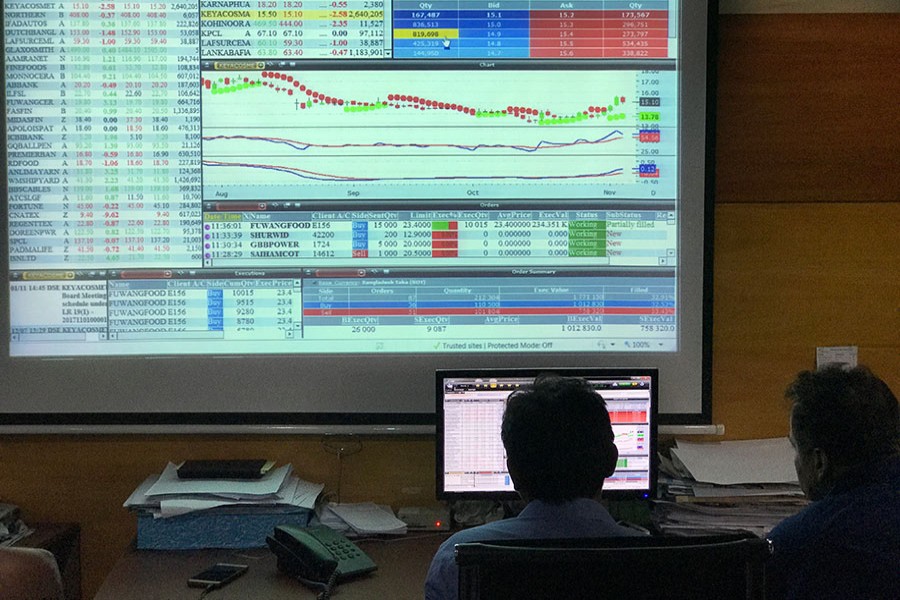
Published :
Updated :

The country's capital market is now performing worse than any time in last 10 years.
The ratio of market capitalisation to GDP, one of the major indicators of measuring depth of a market, was less than 17 per cent in fiscal year (FY) 2017-18 from its peak of about 34 per cent nine years ago in FY 2009-10, the year that saw the market indices skyrocketing for no reasons.
The ratio, 17.52 per cent, in 2008-09 was more than the present level -- 16.94 per cent. It reached a record level in FY 2009-10 before collapsing.
"A low market cap to GDP ratio reflects insufficient depth of the stock market," said DR. AB Mirza Azizul Islam, finance advisor to the last caretaker government and former chairman of the securities regulator.
"The low ratio also highlights the fact that the capital market is yet to be properly used for long-term investments," he said.
The government after assuming office in 2009 had promised to offload shares of fundamentally strong state-owned enterprises (SoEs) as well as its stakes in the multinational companies (MNCs), officials said. But the promise has remained largely unmet.
However, some new companies were listed during the period under review while some existing companies issued rights shares, contributing to the increase in the market cap to some extent.
The market cap increased gradually from about US$ 18 billion in FY 2008-09 and about $ 39 billion in FY 2009-10 to $ 46.5 billion in FY 2017-18, DSE figures show.

But the growth of market cap could not keep pace with the country's economic growth.
As a result, experts said, the capital market, compared to the size of the country's economy, lost its depth.
The size of the GDP was of over $ 102 billion in FY 2008-09, which increased to over $ 274 billion in FY 2017-18.
Market cap is the value of a publicly traded company's outstanding shares at a given time. And, the market cap to GDP ratio, also known as the Buffett Indicator, is a measure of the total value of all publicly traded stock in a country, divided by that country's GDP.
The market cap of DSE, the premier bourse of the country, to GDP ratio is lower than that of the Colombo Stock Exchange.
The ratio on the premier bourse DSE stood at 16.12 per cent on the last trading session of fiscal year (FY) 2017-18, whereas the ratio was 20.29 per cent on that day for Colombo Stock Exchange.
Of other countries, the market cap to GDP ratio is 25.41 per cent in Karachi Stock Exchange, 77.30 per cent in the Philippines Stock Exchange, 77.41 per cent in Bombay Stock Exchange, 114.18 per cent in Thailand Stock Exchange, 119.86 per cent in Bursa Malaysia, 120.37 per cent in Tokyo Stock Exchange and 229.22 per cent in Singapore Stock Exchange.
Experts and stakeholders blamed at least two reasons -- the unsuccessful initiatives to offload shares of SoEs and the reluctance of private companies to get themselves listed -- for the market cap remaining at low level.
Despite policymakers' repeated announcements, offloading of stocks of SoEs continued to elude the market.
The private companies did not find any sort of incentives to come to the market and expose then to general shareholders' scrutiny. Besides, a couple of market collapses and alleged dominance of manipulators have kept the market dull and drab.
Former BSEC Chairman Faruq Ahmad Siddiqi said the market cap to GDP ratio would go up if more companies are listed. The markets of developed countries show higher market cap to GDP ratio due to listing of a large number of companies, he said.
"The government's instruction to offload shares of SoEs has got not enough importance. They did not have necessary political commitment to offloading the shares," he told the FE.
Yunusur Rahman, Secretary of the Bank and Financial Institutions Division, said he held several meetings with the representatives of SoES. "The SoEs spoke about different complexities in offloading shares. In that sense, the success of the government's move is very little," he said.
Asked, BSEC Chairman Professor M. Khairul Hossain said the regulator repeatedly laid importance on listing more companies with the capital market.
"But many companies are reluctant to go public with a fear of losing their control over their companies," he said.
Chittagong Stock Exchange (CSE) Chairman Dr. A. K. Abdul Momen listed a number of reasons behind the poor market cap to GDP ratio.
He said that the investors still lack confidence in the capital market while the companies prefer bank loans to going public.
"The companies go to banks for loans as a few of them do not feel obligation to repay loans. Banks are also providing long-term loans reducing the scope of companies' listing on the stock exchanges," Mr. Momen said.
He said the number of existing listed companies is not enough to present a good market cap to GDP ratio like the stock exchanges in this region.
"The government must offer incentives such as exemption from corporate tax for the companies which will go public in next two years," said the CSE chairman.
He said the tax gap for listed and non-listed companies should be at least 15 per cent to encourage companies having good fundamentals to go public.
"The government must take initiative to get the SoEs, multinational and local companies listed on the stock exchanges," said Mr. Momen.
He said that there would not be an end to manipulation until the depth of the market is ensured.
"The securities regulator should also play a proactive role along with facilitating introduction of new products in the capital market to enhance the market cap," the CSE chairman added.
Presently, the number of listed companies and mutual funds are 297 and 35 respectively.
mufazzal.fe@gmail.com


 For all latest news, follow The Financial Express Google News channel.
For all latest news, follow The Financial Express Google News channel.